On May Day 1944, the bells of the churches of Kaisariani rang mournfully. The bursts at the Shooting Range were continuous, with the trucks constantly picking up bodies. In the streets of the district, the blood of the executed flowed, still warm, with women defying the Germans and their collaborators, coming out of their houses and throwing flowers.
Two hundred patriots, two hundred communists, prisoners in the hell of Haidari, they gave their lives almost smiling, proud and sure that their sacrifice was not wasted. On the notes thrown out of the trucks, or entrusted to third parties to carry to their own people, they sent their heroic message:"It is better to die fighting for freedom, than to live as a slave " wrote the agronomist Nikos Mariakakis. One of the 200, one of those who proudly looked at the Nazi detachment, which was spreading death.
Five months before they left Greece, and while the war was clearly leaning in favor of the allies, the conquerors continued their crimes undaunted, wanting to humiliate and crush the resistance that was constantly growing throughout the country.
On April 27, 1944, the rebels of ELAS in the Molaus of Laconia, led by the infantry lieutenant, Manolis Stathakis, attacked the lieutenant general and commander of the 41st fortress division Franz Krech and his escort. The German major general and three more of his officers were falling dead.
A day before in Crete, members of the British SOE and resistance groups of the island, completed the kidnapping of Lt. General Kraipe.
The Germans roared. Resistance was raging in the mountains. They could not let the rebels thresh, the EAM organize the struggle in the cities. Almost entirely the eastern districts are controlled by the Greek patriots. On April 28, one day later, a house in Ymittos was attacked by Germans and their local collaborators. It is an ELAS ammunition warehouse and it is defended by three EPONites (Dimitris Augeris, Konstantinos Foltopoulos and Thanos Kiokmenidis) who for 7 hours fight a fierce battle against 200 attackers. They fall dead, but the resonance of heroism reverberates throughout Athens.
The conquerors' decision to attack and execute Krech is published in the newspapers on the eve of May Day. Execution by firing squad of 200 communists. Another hundred were exterminated - without a corresponding German order - by the colonel and leader of the Peloponnese security battalions, Dionysios Papadogonas, also due to his personal relationship with the German lieutenant general. The fact was confirmed by Wing Commander Helmut Felmi, head of the German troops in Greece, in his testimony at the Nuremberg trial.
The Germans themselves
had shared it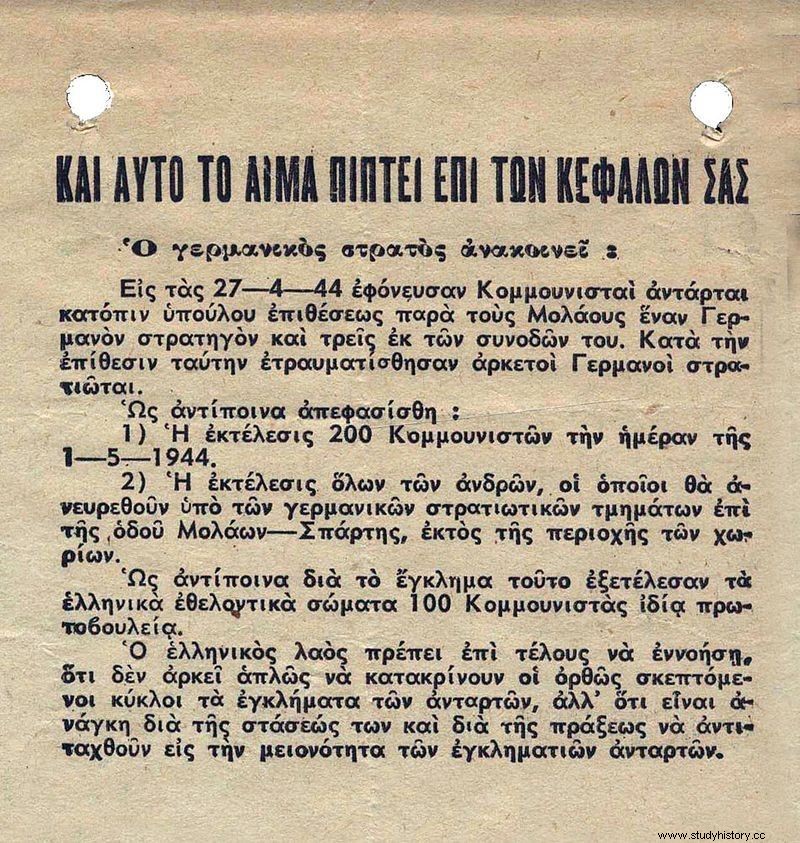
The camp of Haidari
The barracks that had been built by Metaxas in Haidari, turned into one of the harshest concentration camps in all of Europe. It is estimated that in the one year it operated (3/9/1943-27/9/1944) it "hosted" 21,000 prisoners. Almost all Jews who were imprisoned there, were transported to the Nazi hellholes on German soil. The Akronauplio communist prisoners were also transferred there, whom the Silk dictatorship, after refusing to allow them to fight in Albania, handed them over to the conquerors.
At first they were under the jurisdiction of the Italians, who transferred them from Southern Greece to Larissa. In the end they decided to send them to Athens and to the Germans, as Italy began to shake internally and knew that in the capital it would be easier to control the prisoners.
In August 1943 the commanders of the prisons of Larissa, sent by train about 600 prisoners, among them 243 Akronaupliots and 20 also old exiles, from Anafi . Four female figures of the resistance also passed through the gates of the camp:Electra Apostolou, Iron Konstantopoulou, Lela Karagianni.
The transfer of all of them to Haidari also marked the beginning of the full operation of the camp, which quickly changed from Italian management to purely German management. Sergeant Trepe took charge at first, with the camp quickly turning into a place of torture.
SS Major, Paul Radomski , infamous for his brutality at the Sirets concentration camp in Ukraine, organizes Khaidari under forced labor standards. The prisoners are divided into hundreds, perform tasks many times without a purpose, are subjected to canopies while Radomski himself will execute with his revolver the prisoner Levi, who tried to escape.
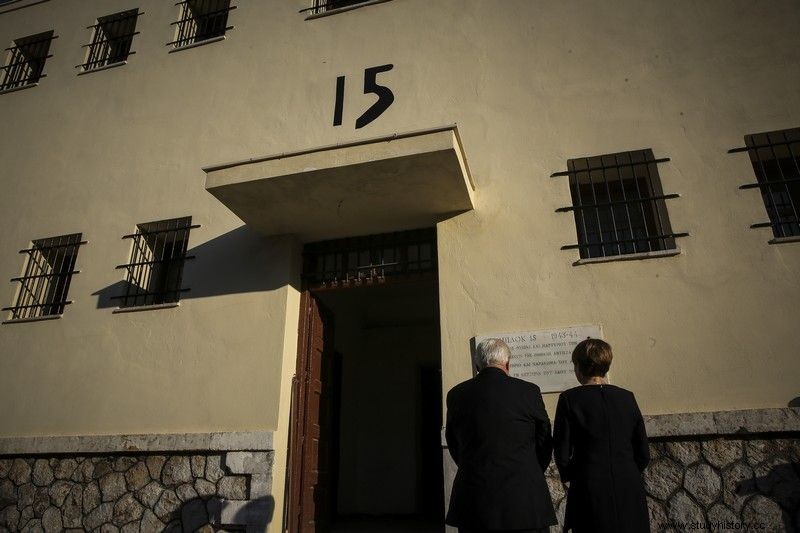
During most of the day the prisoners do work in various parts of the camp, except for block 15, where the isolation cells and the wards where mainly the communists are kept are operated. The windows high on the walls so that theprisoners cannot to see through the bars, a place of skulls in the hideous camp. A barrage of executions follows. It is estimated that 1,800 people were killed by the fire of the German detachments, among them the invalids of the Albanian war, who had been captured (and taken to Haidari) in the pogrom of November 43 by the Nazis and the partisans.
The peasant and drunkard Radomski one night, not in control of himself, attacks and beats a junior officer. The Germans relieved him of his duties (he was killed in 1945 in Hungary) and assigned the management of the camp to Lieutenant Karl Fischer. More "sophisticated" than Radomski, he will be the one who will take the list of 200 names and pronounce them, one by one, to be transferred to Caesariani.
Napoleon Soukatzidis
The camp is organized by the gunpowder-smoking Acronauflians . The life of the prisoners is based on solidarity, camaraderie and the relationships they develop with each other, to endure the inhuman daily life. Among them is the 35-year-old interpreter, Napoleon Soukatzidis, whose refusal to the German proposal to save himself and not be executed, was the crowning act of a life that this versatile and studious personality dedicated early on to a better world.
Born in 1909 in Boursa, after the Asia Minor disaster he found himself with his family in Arkalochori, Crete. He graduated from the middle commercial school of Heraklion, having a great talent in foreign languages. Before he was arrested in 1936, he already spoke four:English, French, Russian and Turkish. The other two (German, Italian) he learned in prison, where the dictatorship sent him to "get to know" them from the age of 27.
Soukatzidis organized early in the KKE, he became the president of the Heraklion commercial employees' union. The writer Themos Kornaros (1906-70), who met him in Haidari, wrote about Napoleon's life in Crete:
"Since 1928, he was the soul of the largest shipbuilding and industrial company of Crete, Liopyrakis and Co.... He was not yet twenty years old. He spoke and wrote four languages... Junior staff in the accounting office, the newest in office. And yet:Merchants, factory owners, producers, shipping agents, newspapers, they asked Napoleon to discuss their affairs...
... He reads 3-4 newspapers, systematically follows the artistic and philological movement of the country. His particular passion is Cretan folklore. And his greatest pleasure is to study and learn by heart the Cretan theater and the Cretan mandinades. Refugee from Bursa did not want to be a guest. He wanted permanent roots. His own house on Cretan land. Within a year he managed to get the Cretans to grant him a plot of land to build on. The most valuable, their heart.
With the clerk, which clerk the Cretans don't have much love for. But this child is different, they said, he is our child...
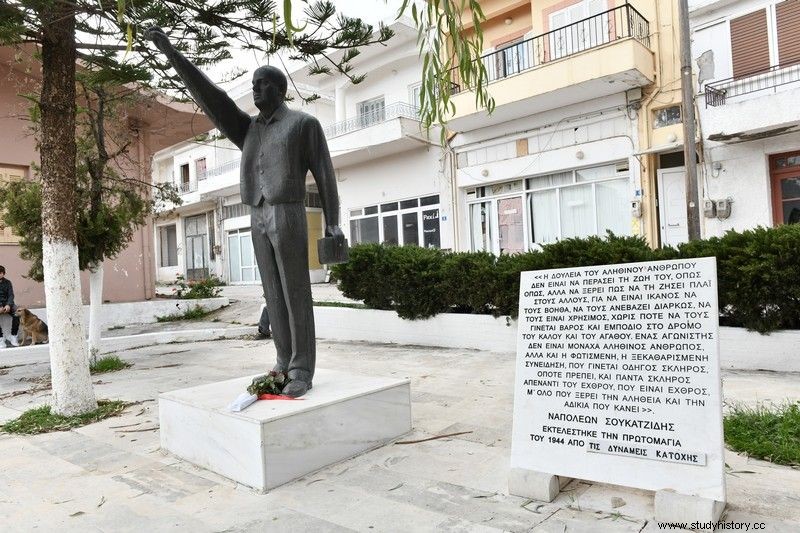
...Raisin growers who were harvesting their crop and waited months to find a price that would at least cover their expenses. Carob growers, desperate that they were often forced to return the carob back to the village, a twelve-hour drive, with the animal slaughtered because the market "stopped". In the end, everyone learned this information:"Liopyrakis, they say, is a pain in the ass. Whoever goes doesn't leave like that. And if he doesn't buy his crop, at least he gives him a warehouse so he doesn't have to walk back. Sometimes he also gives small loans." .
They went and when they left they had to talk about his good manners, but above all about his laugh. Angel! And they decided that they would change their dealer. He was the only one they would turn to. Thus all the villages learned that the businessman Liopyrakis was a child. A very smart and kind-hearted child who always laughed. And he never insulted anyone, many times he gave them pocket money or set the table for them, even if they were not his customers.
Many times villagers disagreed with each other and it was the reason that one knew that the businessman was called John and the other stubbornly insisted that he heard others and called him Napoleon many times. And today there may be old, disaffected farmers who will insist that the national hero Napoleon Soukatzidis is the businessman I. Liopyrakis who, who knows why, got this nickname" i>
In 1930, when he was only 21 years old, he became a member ofErgoteli . There he created the "active citizens", i.e. poor young people from all the villages and neighborhoods of Heraklion, who found shelter in the church building on Evans Street, while they trained in the football team's clubhouse. At the same time, he showed them the way to improve their studies, to learn an art.
Wild joy against death
This anti-national action of his, however, disturbs the dictatorship of August 4. From 1936 until his execution, he will spend his life behind bars and there he will meet all his later comrades who will make the journey from Akronafplia to Haidari. In the Athenian camp, Soukatzidis tries as an interpreter to save lives, an isolation, a torture. Many times he juggles his relationships with the camp administration and the survival of the prisoners.
Kornaros writes:"Left-handed, modest, always happy. He considers loving his companions his most serious business. He does not neglect his things. His corner sparkles with cleanliness. On the wall above his headboard, the photographs of his father, his beloved, his friends. It is imposed on both friends and prison guards. They respect him".
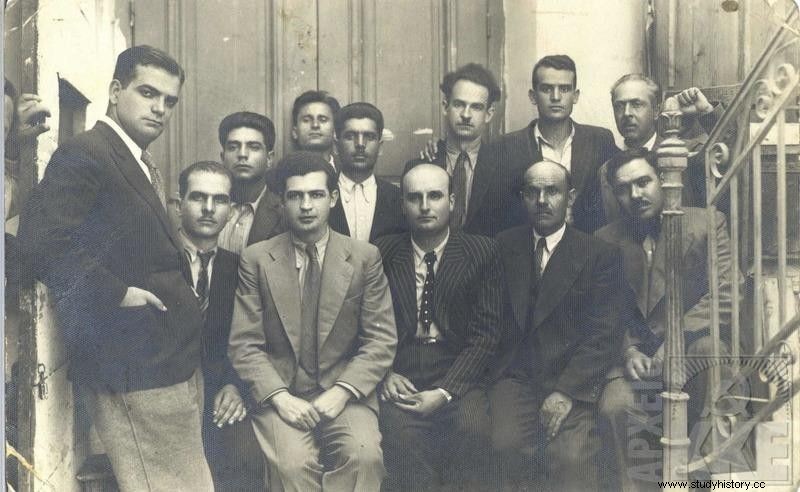
News of the execution of the 200 leaks into the camp through the Athenian newspapers. Fischer tries to throw ashes in the eyes by saying that the communists are just about to be transferred from Akronafplia to other prisons. Zisis Zografos, later a member of the KKE, hears the German commander asking him for 15 prisoners who absolutely had to remain in the camp. At some point the German realizes that the Painter was trying to save as many as possible. "Turn off..." he ordered.
Manolis Mantopoulos, years later, recounted that while his name had been erased, he was not taken back to them for execution and in the end he remained in the camp. On the evening of April 30, themortals they await the dawn with dances and songs! No one is afraid, but to be afraid, hugs and dances with his partners. The dance of Zalongos. A wild joy, it overcomes the fear of execution and triumphs with screams and songs of redemption.
The same will happen, in front of the astonished eyes of the Germans, the next day as well. When slowly, they gather in groups of 20, to go to execution. "The song there lit up. For years now the lads were enslaved, their lips were closed. Now, in their last moments, they became free again. Songs, which they had years to sing filled the atmosphere of Haidarios. Shivers of emotion, a swelling in the chest, a soul's exaltation took hold of us. After the song, the dance begins. Kalafatakis wears a sariki and a Cretan belt, which he has kept as sacred relics, and leads the dance first. N.Mariakakis follows and others. Passing by in front of them to go to work, we say goodbye to them for the last time. Mariakakis jumps off the line:
- Hello Lefteri, greetings to the homeland, And he shakes my hand.
All the desires of the lad are closed in these two words. For Crete and its people. Such was the atmosphere and our executioners themselves, who behaved coldly and for the first time seemed numb and gave us a chance to say goodbye to our friends. But the beastman Kovacs (s.s. the most inhumane prison guard, only 18 years old, of Hungarian origin) a black dog that was coming at that moment, fell with its muzzle on us".
The short story belongs to a fellow prisoner of 200 and was published for the first time in Rizospastis, in 1975.
Others try to give written messages to reach their people, or some personal items to be recognized by relatives and friends, a jacket, a baby blanket...
"Hi, Dad"
Fischer gets tired of pronouncing the names of the Greeks under execution. At one point, in fact, he stops and drinks a glass of water. He continues, however, and reaches the name Napoleon Soukatzidis.
There is a thunderous "present" and Soukatzidis hands over thedocuments of Thanasis Meremetis, second interpreter of the camp. "Not you, Napoleon," says Fisher, but receives a gagging reply:"I accept life, but on the condition that I take it from no one else. On the condition that my place be left empty."
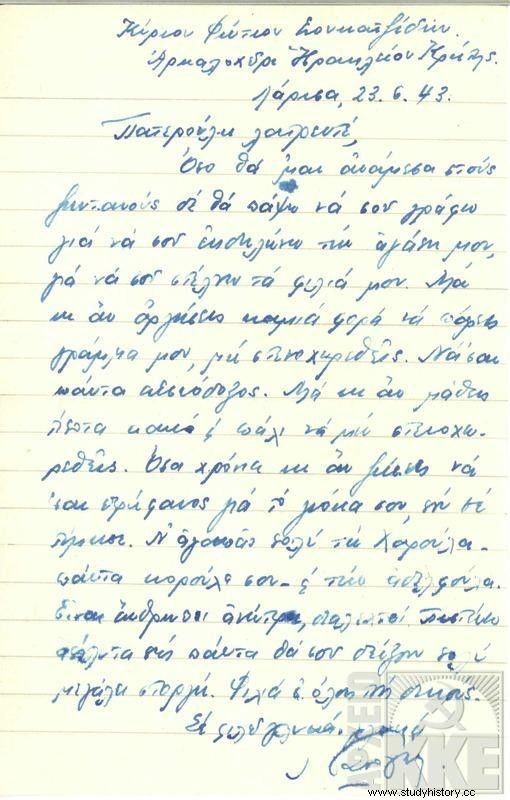
A little later, the German will try to convince Soukatzidis again, in the kitchen area, while all the dying are gathering for departure. Napoleon does not accept conversation and asks Fischer:"Would you put your last soldier in my place." The German answers in the negative and everything is over. It is not possible to "disobey" the order. 200 should be run, not 199.
Soukatzidis greets with a smile and writes the last note (made into a film by Pantelis Voulgaris in 2017) to his father:"Father, I am going to be executed. Be proud of your only son. Love and adore him my little daughter and my little sister. Both great people. Hello, hello, father. Napoleon..."
